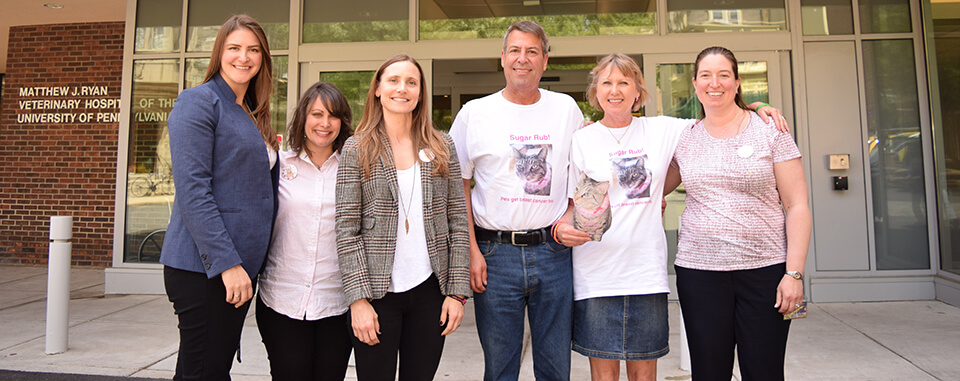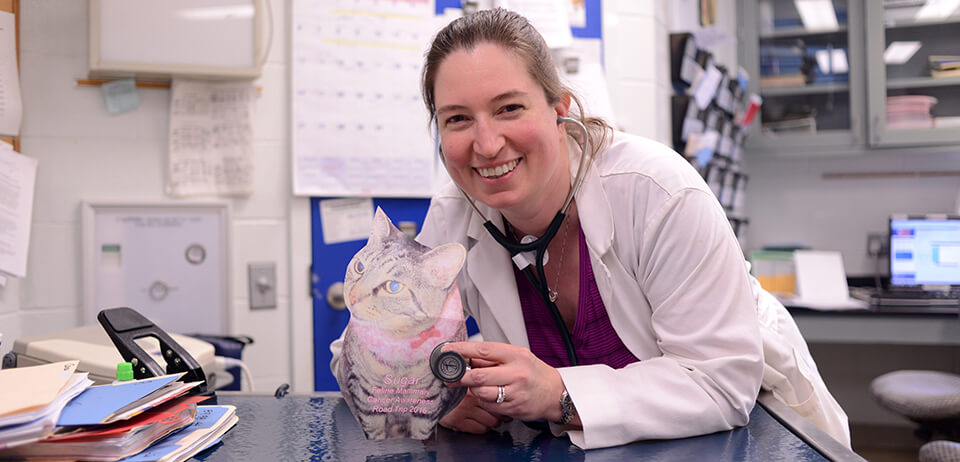
In 2013, Jeanette Cereske found a lump on her cat Sugar’s chest, and a few days later a biopsy confirmed Cereske’s worst fear. The tumor was malignant; Sugar had breast cancer. The 11-year-old tabby underwent a mastectomy, lumpectomy, and chemotherapy, surviving for 16 months after her diagnosis. During that time and in the years since, Cereske transformed her personal loss into an effort to turn the tides on feline mammary carcinoma through awareness and research.
“I knew cats get breast cancer,” she said from her home in San Francisco. “But after Sugar’s diagnosis, I started reading up on the disease and learned how deadly it is. I also realized many cat owners don’t know about it, and that there is very little research out there. I thought someone should do something.” Cereske became that someone.
Breast cancer is the third most common cancer in cats after lymphoma and skin cancer. It’s frequently diagnosed in cats older than 10 years—existing research indicates that cats spayed in their first year are less likely to develop mammary tumors. Of those tumors that do develop, 85 percent are malignant and aggressive. Prognosis depends on the size of the tumor at the time of diagnosis, so early detection is key to longer survival times for patients.
Shortly after Sugar’s mastectomy, Cereske made a video starring Sugar that encouraged cat owners to conduct regular breast exams or, in Cereske’s spontaneous turn of a phrase, “Sugar rubs.” The phrase stuck and so did the message. Both ignited a much larger campaign to build awareness about feline breast exams and raise funds for research.
Cereske created SugarRub.org, a website with information about breast cancer in animals, particularly cats. Designed in the hue of breast cancer awareness pink, the site is the anchor for Cereske’s growing campaign that now includes events such as Sugar Rub’s Pink Auction to Benefit Feline Mammary Cancer Research.
Cereske learned of Penn Vet while investigating promising research to support. At the time, Dr. Erika Krick, V’02, was planning a clinical trial for mammary carcinoma in cats. “I told Dr. Krick I wanted to raise money for the study,” said Cereske. “She crunched some numbers and came back with a goal of $50,000.”
 Cereske, who works full time and runs Sugar Rub as a volunteer, began small by selling Sugar Rub merchandise and donating the proceeds. She then ventured into crowdfunding, launching the Sugar Rub Fund for Feline Mammary Carcinoma Research on Penn Giving Pages—a resource for donors to raise and target funds for priorities close to their hearts. As of early June, 191 people had given a total of $35,600 to the Sugar Rub Fund.
Cereske, who works full time and runs Sugar Rub as a volunteer, began small by selling Sugar Rub merchandise and donating the proceeds. She then ventured into crowdfunding, launching the Sugar Rub Fund for Feline Mammary Carcinoma Research on Penn Giving Pages—a resource for donors to raise and target funds for priorities close to their hearts. As of early June, 191 people had given a total of $35,600 to the Sugar Rub Fund.
Although nearing the end of Sugar Rub’s current fundraising goal, Cereske has no plans to stop. Sugar Rub has a social media following in the thousands. Its message has traveled across the United States and reached as far as the U.K., Greece, and New Zealand in the form of “Flat Sugar,” a paper, life-size cut-out of Sugar that Cereske sends to Sugar Rub followers around the world. People then pose with the paper cat and share pictures on social media and with Cereske, who has amassed a large album that she shows off online.
“I’m going to fight until the end of this cancer. Even my estate is set up to keep this work going,” said Cereske. “Gratitude is the true north of my moral compass. I am grateful to be doing something positive, in Sugar’s memory, that will help other cats and hopefully humans, too.”